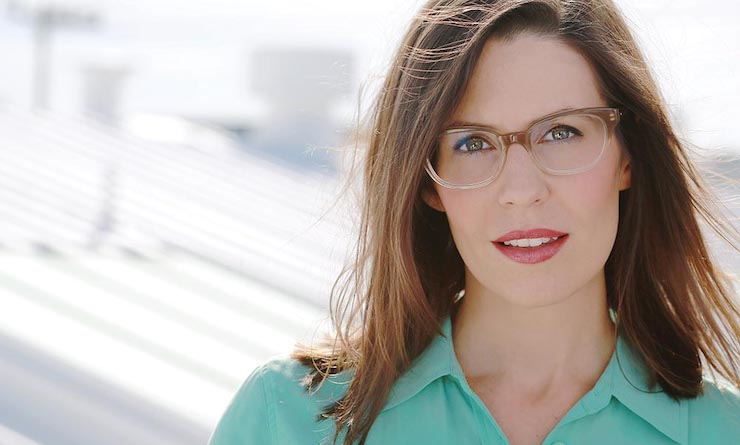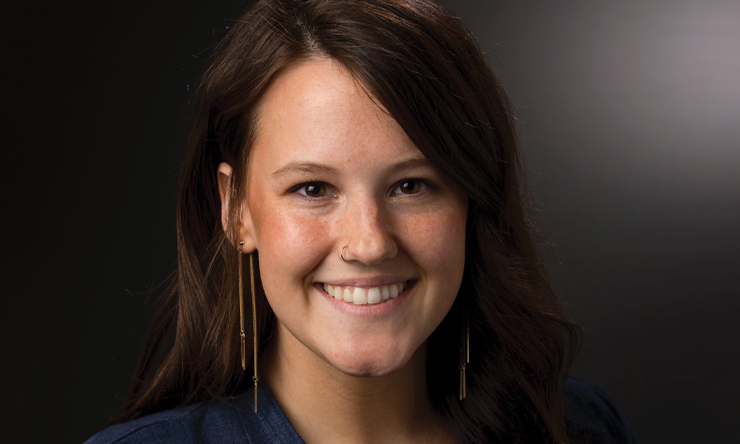Lauren Gunderson is one of my favorite playwrights. I will never forget how I felt after reading her play, Silent Sky, for the first time. Her language was so evocative and expressive, that by the play's conclusion, I had actual goosebumps. Her storytelling capabilities are that impactful. I consider myself incredibly lucky to be able to interview one of the most iconic voices in American theatre today.
Tell me a little bit about your theatre background. Where did you grow up? Where did you go to school? Where are you working now, etc.?
I'm from a town called Decatur, Georgia, which is right outside of Atlanta. I grew up going to public schools before going to Emory University for undergrad, which is where my dad was working for the university. I had a nice little way to go to school without having to pay too much tuition which is nice. (haha)
Then I went to grad school at New York University's Tisch School of Performing Arts where I studied Dramatic Writing. As for my theatre background, I started as an actor. I started very young and was in elementary school when I did my first professional play as an actor.
I grew to be smitten with being on stage, and then gradually realizing the stories come from the writer, and the writer has the power to name the hero, and why they are the hero, and if they win or lose. It felt unlimited the depths you could get to as a playwright, as opposed to an actor, so that's when I started exploring writing. I say that because I have been writing for a long time. I am lucky that I knew what I wanted to do early on, so that I could really devote my life to it.
A lot of your plays deal with historical figures, specifically women scientists – Silent Sky, Ada and the Memory Engine, etc.? How do you decide which stories from the past deserve dramatization? Furthermore, where does your inspiration come from to write these plays?
The question is always: well if you want to write, what do you want to write about? I find such incredible intrigue in history. Theatre has this wonderful ability to feel like time travel, to write about historical moments. And I just love that.
Also, it's a place where we can examine our current state of mind, but examine them through history. The history is a lens to understand where we are now. I think that's very true and helps us understand who we are by looking at who we were.
I have also always loved science and feel that the valence of science is very high. The energy of putting science on stage is very dramatic. Science belongs on stage. These eureka moments, these struggles, specifically for women or people of color, in science where there is such bias against them, make for great drama. So that is why I turn to science and turn to history. The stories that deserve dramatization are the ones that tell us something about how we got to where we are now. The stories can't just be something interesting from the past. They have to speak to this moment.
American Theatre magazine recognized you as the most-produced playwright in the 2019-20 theatre season, which is the second time you've received that distinction. Why do you think your plays resonate so well with American audiences?
I always get asked that question and I have no idea how to answer it (haha) because I don't choose which plays to program. I would love to ask other people who chose those plays. But my guess is that, I write a lot. I write plays that I like to describe as having endings with hard hope. So I don't end plays with violence, depression, or darkness. There's always some hope. Now it's not the cheesy, "everyone wins" kind of hope. It is a hard kind of hope. But it makes the characters and hopefully the audience want to keep fighting, keep going, keep living, and keep learning at the end of the play. Read the American Theatre article (9/19/19)
Lauren Gunderson
"The only way to get better at writing is to write. And the only way to get better at plays, is to make them."
Looking ahead, the question on a lot of people's minds is: What will theatre look like once theaters are allowed to reopen? What are your thoughts on that question? Furthermore, what – if any – changes would you like to see American theatre embrace moving forward?
I think, "Who knows?" I think it will look in many ways similar to what we had prior. People are going to want those holiday classics, those big historical plays, those big funny musicals. I don't think the pandemic has changed our taste. It has changed our access and our ability to put those types of shows on. So, I think in some cases we are going to see super small, intimate plays partly because those are the ones that will need to pivot to be digitized if the pandemic resurges. But also because there is a lot of money lost. So small plays, with small casts might be attractive to companies that are really trying to make it.
But then again, one of my colleagues, Eric Ting, who is the Artistic Director of CalShakes out here in the Bay Area said something that I really resonated with as well: "When we come back, some of us are going to want the biggest, most dramatic, most elaborate theatre we've ever seen because of how little theatre we have seen. So when we come back, we want to come back big."
I think that says anything is on the table. I think we're gonna be in this pandemic space for awhile – a year or a few. So getting used to wearing masks, and seeing a lot of theatre outdoors, and having limited audiences, is going to be important. I hope how accessible theatre has gotten – the ability to stream, the ability to share access, etc. – in this time sustains.
But I also think the thing that is most critical for us is the racial reckoning. The pandemic is one part of how theatre will change, but the racial reckoning is another. And that is in some ways much more important. The idea of equity, diversion, inclusion – the affirmation of all people in the theatre space, and how that changes leadership, which plays are chosen, how casting works. All of that is critical for young theatre makers to understand moving forward. So looking at the We See You, White American Theatre document that is so incredible, and brilliant, and brave and necessary. I think that is so critical. I hope that document changes every single thing about how theatre works. Broadway and every theatre in the country should look at how their work affects marginalized audiences.
What would you say is the most rewarding part about being a playwright?
Ooh man. It's honestly being an audience to your own work. (haha) There's lots of things that are rewarding, but one of the most satisfying things is sitting in the audience and hearing the other audience members and really seeing an actor find that perfect moment. I love seeing it all really come together.
With over 20 plays in circulation, and numerous playwriting award wins under your belt, you have undoubtedly accomplished a lot in your career. That being said, what are your career goals moving forward? What would be your biggest theatre dream come true?
I think either a Broadway musical or a Broadway play. I love collaboration now, more than ever. So collaborating with more and more diverse people is the theatre dream. But I don't know. I just keep writing, so every new play is my next big theatre dream. (haha)
What was the best theatrical advice you ever received? How has that shaped you as an artist?
The thing that occurs to me is from one of my college mentors, Jim Grimsley, who said, "Playwrights write. So write." Which is the simplest advice, but is the most concrete. That if you are afraid to write, if you are procrastinating from writing, that is gonna stop you from being a writer. If you really want to be a writer, then you gotta get up every day and write. That doesn't mean everything you write is perfect or even has to be kept. You can delete it at the end of the day. But the only way to get better at writing is to write. And the only way to get better at plays, is to make them. So that is something I think about a lot.
Lastly, what are some exciting projects that you have in the works?
The one I'm working on, literally today, is a new musical. It's a three-person musical called, Justice, and it's about the history of Sandra Day O'Connor, the first female U.S. Supreme Court Justice and Ruth Bader Ginsburg. That musical is being written with Brian Lowdermilk and Kait Kerrigan and will premiere in March. It will be available to be viewed online, so y'all can see it! I have a bunch of other musicals in the works as well. Including one called Jeanette, which I wrote with my colleague, Ari Afsar, about the first female Congressperson in American history, Jeanette Ranken. That one you can stream a bunch of songs from online now. I also have a play called The Catastrophists, about my husband who is a pandemic expert, that I just finished writing and it will premiere in January. And ooh man. So many. Musicals and plays and musicals and plays. (haha)
All in all, Lauren Gunderson's insight was as impactful as her plays are. I am still in awe that Gunderson agreed to an interview with me, a 21-year old undergraduate college student from Iowa.
But I am forever grateful that she did. In times like today, we all need inspiration – a reminder of why we love theatre and its importance to society. I may just be an undergrad, but I know this interview will always hold a special place in my heart.
Share This Story




